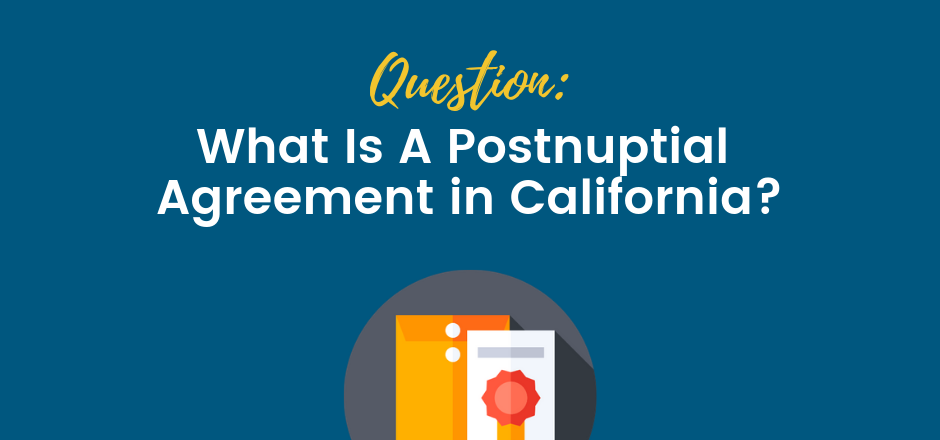What Is A Postnuptial Agreement in California?
A married couple can use a postnuptial agreement to settle their assets in the event of separation or divorce.
A postnuptial agreement in California is a legal tool for married couples.
Similar to the way a prenuptial agreement protects your personal assets and finances before you get married, a postnuptial agreement provides certain protections in case things don’t work out and you end up separating for whatever reason. However, unlike a prenuptial agreement, a postnuptial agreement is an agreement signed after you’re married.
Today, we’re taking a closer look at postnuptial agreements so you can make an informed decision whether or not a postnuptial agreement in California is right for you.
Let’s get started.

What is A Postnuptial Agreement in California?
Similar to a prenuptial agreement where spouses contract on specific terms, usually financial, before their wedding, a postnuptial agreement is a contract made some time after the vows are exchanged to set certain terms of the relationship.
According to an American Academy of Matrimonial Lawyers 2015 survey, postnuptial agreements are growing. But this doesn’t mean that they are right for every couple.
Prenuptial agreements are common in California when either or both parties are of substantial means. Somewhat less known are postnuptial agreements that are sought when something changes in a marriage. A prenuptial agreement is assumed to be valid when it is made. On the contrary, a postnuptial agreement is assumed to be invalid until the court decides otherwise.
So, what can change during a marriage to warrant a postnuptial agreement, sometimes called a “postnup?” One of the spouses may come into more money or may be left with the family business and have new financial assets. Couples may then want to define each spouse’s separate rights and responsibilities given the new conditions.
 Marriage issues can be partially or fully resolved by removing the source of disagreements over assets or inheritances.
Marriage issues can be partially or fully resolved by removing the source of disagreements over assets or inheritances.
One spouse may exhibit a change in behavior, be out of control, and cause the other spouse to seek legal protection with a postnup.
Some couples intended to have a prenuptial agreement but just didn’t have the time to complete it. They wanted to address legal and financial issues in the event of divorce or death. They finalize their intentions – what will be done with investments, 401k plans, stocks, the family house, pets, etc. – with a postnup.
Why is a prenup considered valid but a postnup is not (at first, anyway)? Before the marriage (or cohabitation) takes place, the couple’s assets and debts are separate. Once married, many of these assets and debts become shared.
Once this bond is established, through the exchange of vows, it is more difficult to sever. Either of these agreements, however, prenup or postnup, can be made invalid by either party arguing that he or she was coerced into making the agreement, rather than using their free will.
As marriages last longer, the chances for a postnup grow stronger because there is a greater realization of what each person stands to gain or lose.
California Postnuptial Agreement Requirements
California postnuptial agreement requirements are pretty simple.
A postnuptial agreement in California must be written, signed by both parties, and notarized. This ensures the agreement is enforceable and fair to both parties. A few other aspects are considered when establishing a postnuptial agreement, including the following:
- It must be a voluntary act initiated without deception, coercion, threats, or physical force.
- It must be considered fair, without being unconscionable or extremely one-sided for either party.
- It must be transparent, with full disclosure from both sides about their income, assets, property, and debts.
The postnup should still uphold the duties of marriage outlined in California family code 721.
Why Bother with a Postnuptial Agreement?
Agreeing to a postnup is one thing. Getting it done is another. Drawing up the agreement can be quite a challenge. If both people are rational and can discuss their individual values and intentions as well as what they can agree on, the agreement can proceed more smoothly. If, however, they are facing a future divorce, their viewpoints may change.
What can lead to a postnup? One reason is that some information about the spouse is discovered after the vows are exchanged. There can be shortcomings not seen before.
A spouse may become addicted and dependent on alcohol or drugs. Perhaps it is a resurfacing of a problem before marriage that was thought to be under control. Perhaps it is a new problem.
A spouse may have tendencies to overspend on clothes or luxury items. And this tendency can threaten the financial stability and solvency of the marriage.
There can be an act of infidelity or another breach of trust that can lead one spouse to suggest a postnup to redefine some terms that would further benefit the other spouse, perhaps in a mood of repentance.
There could also be a clause in a postnup that awards or denies alimony automatically in the case of cheating.
Marriages are often between people of similar incomes with near equal financial contributions to the marriage. But this can change, for example, when one of them has a business that suddenly becomes much more profitable.
Things can also change if one is named an heir to a family estate.
One spouse may become ill or have to give up personal income to care for a special-needs child. Stay-at-home moms give up earning power to care for their children.
If a spouse thinks he or she is about to become a single parent, there may be a desire to define a source of income to protect themselves.
How Is A Postnup Used?
A postnup in California can be used to address and determine many issues, including:
- Which spouse should pay alimony or spousal support and for what period of time?
- How should marital assets be divided?
- How should debts be divided (e.g. mortgages, loans, and credit cards)?
- What is each spouse’s interest in the marital home and other properties?
- Who gets the family pet (sometimes one of the more difficult agreements)?
There are some conditions that are frowned upon in California and in most other states as well. One condition is the waiving or limiting of post-divorce spousal support. Another is the limiting of child support or child custody, and any attempts to do so will render the agreement unenforceable.
A Postnup Isn’t for Everyone
A postnup is not a universal solution to disagreeing married couple. There are pros and cons. A postnuptial agreement can often be attempted by a rich spouse who wants to avoid paying alimony to a lower-earning spouse or wants to protect future assets. This may be a detriment to the lower-earning spouse who might benefit more by going to trial.
If your spouse is suggesting a postnup, it is a good idea to get your own attorney. Your spouse’s attorney cannot represent you, too, because that would be a conflict of interest. Your own attorney can advise you on the pros and cons of signing a postnup vs. going to trial.
You can be confident that a judge will uphold any fair and legal agreement and will enforce it in the face of any courtroom challenge. The judge will also throw out any agreement that does not meet legal requirements.
Are you in search for a certified attorney to represent you?
Let us help you find one today!




